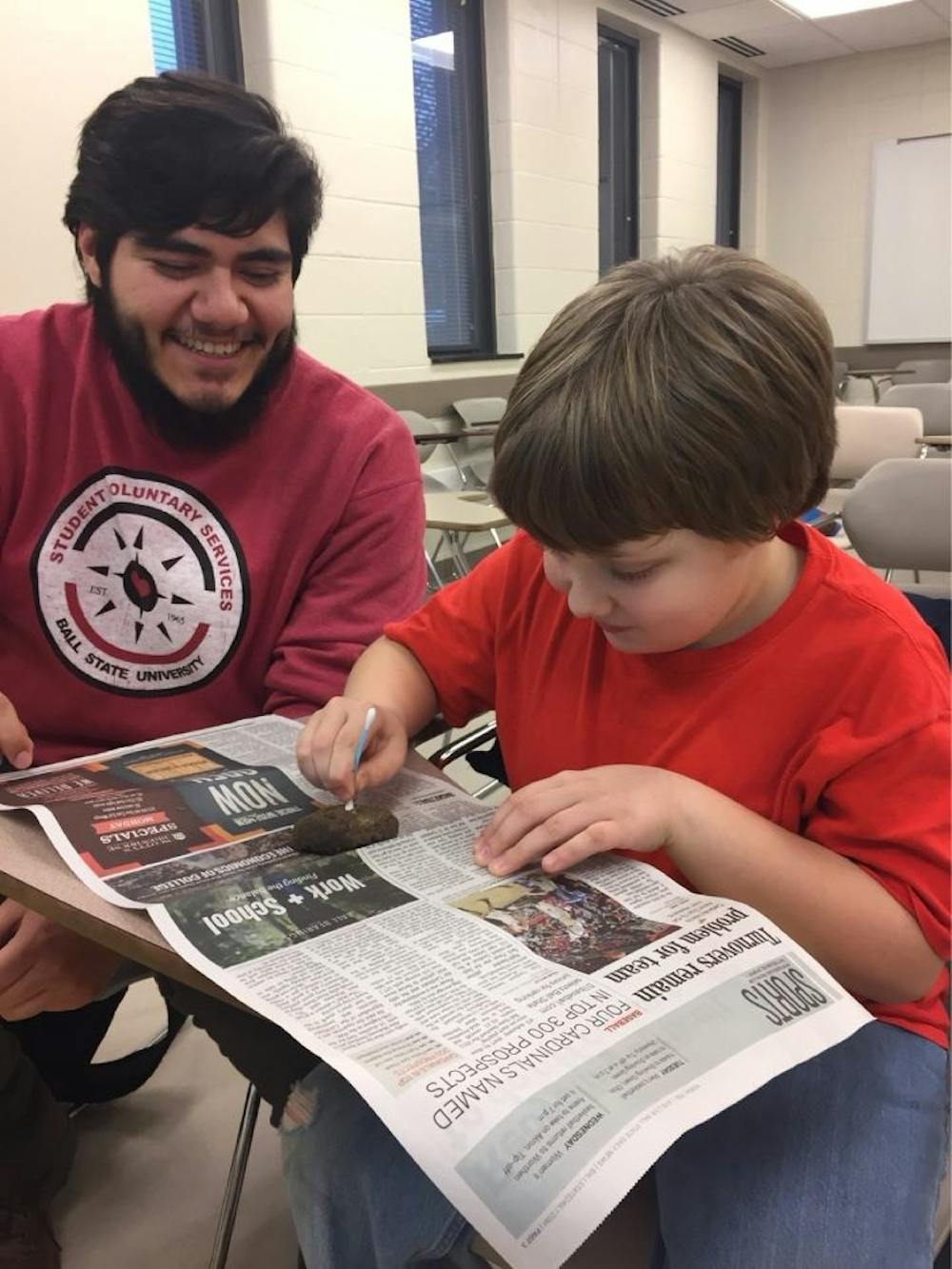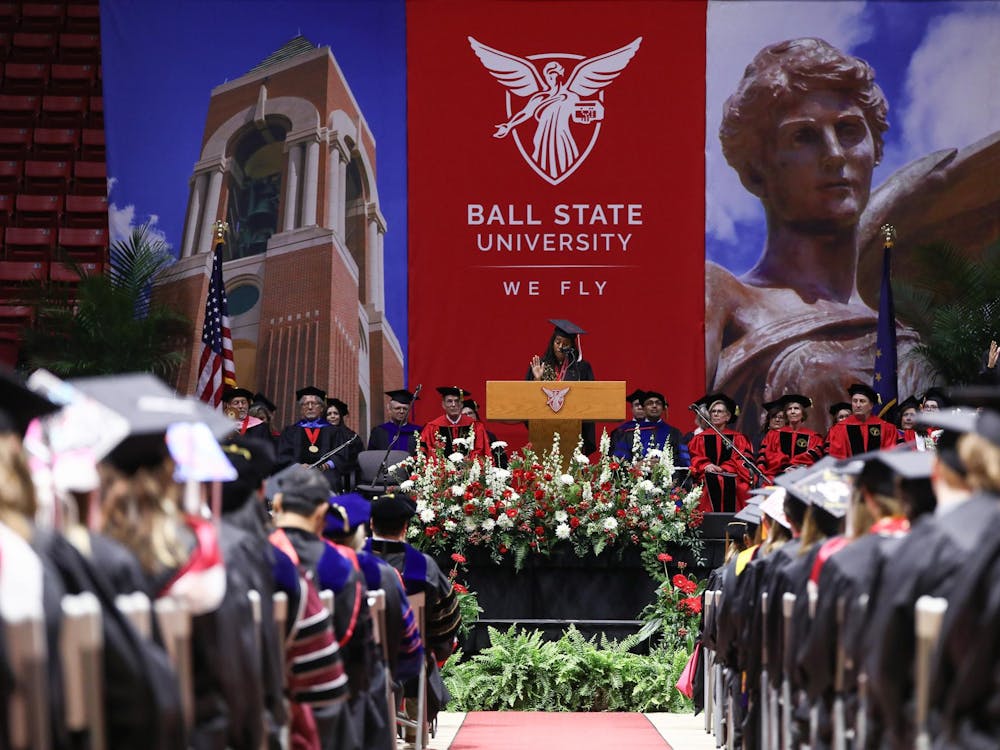If you are interested in becoming a mentor in the program, contact Lexi Wood at amwood@bsu.edu about applying and look out for a call-out meeting during the Fall 2016 semester. You can also apply via collegementorsforkids.org by visiting the site and clicking “become a member.”
Every Monday at 3 p.m., freshman Emily Clouser waits with anticipation as a bus of New Albany second graders arrives on Ball State’s campus.
Her eyes search the crowd until, suddenly, a boy runs up out of the sea of students and tackles her with a hug.
It’s Christopher, her little buddy in the College Mentors for Kids program, and she’s become pretty attached to him.
“He was so excited, he gave me a hug before he even knew my name,” she said of the first time they met in September 2015.
Since then, Clouser and other mentors like her have formed close relationships with their buddies and built memories neither will forget.
“She was really quiet in the beginning, and we weren’t always sure of what to say to each other,” said freshman Mary Fuchs about her buddy Kelsey. “But now, we just talk the whole time.”
Among Kelsey’s favorite topics are giving “life hacks” to her mentor — Fuchs says their friendship is the best part about the program.
While Ball State’s College Mentors for Kids serves 220 kids from five grade schools, it is one part of a larger national program that contains 33 chapters and reaches more than 2,000 grade schoolers.
The program matches college students with a buddy from 1st through 5th grade. Younger students are eligible for the program if they are considered at risk of not attending college due to personal situations.
One day a week, the students visit campus and participate in different activities to introduce them to the opportunities available in college.
This year, Ball State’s chapter implemented an Activity Planning Committee to organize the activities the children engage in each week.
Previously, mentors had been responsible for planning the weeks’ events. Though changes within an organization can be difficult, Jami LaFord, the current president of College Mentors, feels it was worth it.
“Starting something new is definitely a challenge, but our committee is fantastic,” she said. “I believe this change is going to be so beneficial for us in the years to come, because instead of mentors worrying about planning the activities, they can focus on their little buddies.”
Throughout the course of this year, the committee has planned a tour of Scheumann Stadium, a lesson with the Ball State quidditch team and a government day with the Student Government Association.
Marco Leon, the vice president of the activity planning committee, has found the role to be rewarding.
“I struggled with it at first, but eventually I jumped on board and we all worked to make it as strong as possible,” Leon said. “From the beginning, I wanted to do all I could to help the buddies and make it fun and entertaining, but also make it educational and for them to get something out of it.”
In addition to being a mentor, Fuchs is the only freshman member of the new Activity Planning Committee.
All mentors have to be interviewed for the program about their experience, interests and reasons for wanting to join the program. When Fuchs interviewed, she asked how the activities for the kids were planned. They told her about the new board, and she was later offered both a mentor and committee position.
While she feels she has been able to make an impact on the buddies, it is the kids’ impact on her Fuchs found most significant.
“I feel like she’s changed me to be more open to going out of my shell,” she said of buddy Kelsey. “I watch her grow so much with her buddy family, and I feel like I’ve become more of a leader just within activity planning. I just want to be a good role model for her. Anything I tell her to do, I want to be able to be doing it too.”
Leon has seen the effect the program can have on the buddies’ future in action. His fourth-grade buddy Cody has become more interested in college since joining the program.
Originally, Cody was averse to the idea of college, only wanting to become a rockstar. After a recent activity, however, he began to change his mind.
“We went through the architecture building and were able to see all the models and artwork, and the cool tools they get to use like the laser cutting and 3D printing,” Leon said. “Of course, he still wants to be a rockstar, but he said, ‘Yeah, I could see myself doing architecture along with that,’ and I was like ‘Alright, man!’ It was cool just to see from the beginning of the year when he said, ‘Nope, no college, never,’ to one of these activities starting to change his mind.”
As Clouser reflected on her first year in the program, she was most grateful for the small moments that allowed her to be a good role model for someone who needs it. Christopher is also fond of her.
“For Christmas, he wanted to get me a present, so he got me a shoebox, and he cut a picture of shoes out from a magazine and put it inside,” she said. “When I opened it, he said he got me a new pair of hot shoes — they were red heels.”
LaFord has witnessed the relationships that form over time through the program.
“Seeing that relationship between the buddy and the mentor is so awesome, especially when the two didn’t even know each other six months before,” she said. “Seeing where our chapter is now compared to where it was my freshman year is incredible.”
Most of the mentors come from similar areas, like education, social work or speech pathology. As the program looks ahead, future program president Lexi Wood explained they want to expand their outreach on campus.
“We hope to get more involved throughout campus and reach a variety of different majors to become mentors,” Wood said. “Our organization thrives when having variety, and we are looking to expand majors and genders. Our organization is also unique in that we have many different leadership positions available.”





